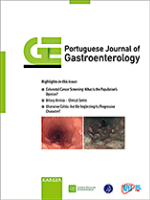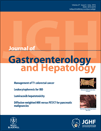
Visceral Medicine
Scope & Guideline
Navigating the Future of Visceral Health
Introduction
Aims and Scopes
- Gastrointestinal Diseases:
The journal emphasizes research on various gastrointestinal disorders, including inflammatory bowel diseases, cancers, and functional gastrointestinal disorders, aiming to improve diagnosis, treatment, and patient outcomes. - Hepatobiliary Medicine:
Research in hepatobiliary diseases, including liver cancers, cirrhosis, and hepatitis, is a core focus, highlighting advancements in surgical techniques, pharmacotherapy, and patient management. - Innovative Therapeutics:
The journal publishes studies on novel therapies, including biologics, immunotherapies, and microbiota-based treatments, contributing to the development of personalized medicine in gastrointestinal care. - Surgical Techniques and Outcomes:
A significant portion of the journal is devoted to surgical methodologies, outcomes, and complications associated with gastrointestinal and hepatobiliary surgeries, providing insights into best practices and innovations. - Interdisciplinary Approaches:
The integration of various medical disciplines in the management of gastrointestinal diseases is encouraged, reflecting the journal's commitment to collaborative research and clinical practices. - Patient-Centered Care:
The exploration of patient experiences, quality of life, and psychosocial aspects of gastrointestinal diseases is vital, ensuring that treatments align with patient needs and preferences.
Trending and Emerging
- Microbiota Research:
The exploration of microbiota and its role in gastrointestinal health is gaining momentum, with studies focusing on microbiota-based therapies and their implications for conditions like inflammatory bowel disease and cancer. - Immunotherapy and Targeted Treatments:
Emerging research on immunotherapeutic approaches and targeted treatments for various cancers, particularly hepatocellular carcinoma and colorectal cancer, reflects a growing trend towards personalized and effective cancer therapies. - Digital Health and Telemedicine:
The rise of digital health solutions, including mobile health applications and telemedicine, is increasingly relevant in managing chronic gastrointestinal diseases and enhancing patient engagement. - Interdisciplinary Collaborations:
There is a growing emphasis on interdisciplinary collaborations, integrating insights from surgery, oncology, immunology, and gastroenterology to improve patient outcomes. - Psycho-Social Dimensions of Care:
Research focusing on the psychological and social aspects of living with gastrointestinal diseases is emerging, emphasizing the importance of holistic patient care.
Declining or Waning
- Traditional Surgical Techniques:
There is a noticeable decline in publications focused solely on traditional surgical methods, as newer, minimally invasive, and robotic techniques gain traction in clinical practice. - Conventional Pharmacotherapy:
Research centered around conventional pharmacotherapies is waning, likely due to the increasing emphasis on personalized medicine and the exploration of novel therapeutic agents. - Epidemiological Studies:
While still important, the frequency of purely observational epidemiological studies has decreased, possibly overshadowed by more intervention-focused research. - General Gastroenterology Reviews:
The number of broad, non-specific reviews on gastrointestinal conditions is declining, as the journal shifts towards more targeted and specialized studies.
Similar Journals

GE Portuguese Journal of Gastroenterology
Pioneering Open Access Research in GastroenterologyThe GE Portuguese Journal of Gastroenterology, published by KARGER, is a prominent platform in the field of gastroenterology, providing a vital forum for the dissemination of high-quality research since its establishment. With an open access model implemented in 2012, the journal ensures that emerging findings in gastrointestinal health are readily accessible to a global audience, facilitating the exchange of critical knowledge among researchers, practitioners, and students alike. Based in Switzerland, this journal has earned a respected position within the academic community, currently holding a Q3 ranking in the gastroenterology category for 2023, alongside a Scopus rank of #113 out of 167 in its field. Spanning converged years from 2014 to 2024, the GE Portuguese Journal of Gastroenterology aims to bridge gaps in research and practice, fostering collaboration and innovation across diverse areas within the discipline. Authors and readers alike benefit from the journal's commitment to advancing knowledge and practice in gastroenterology.

JOURNAL OF PEDIATRIC GASTROENTEROLOGY AND NUTRITION
Exploring the vital link between digestion and childhood well-being.Journal of Pediatric Gastroenterology and Nutrition is a premier academic journal published by Wiley, focusing on the critical intersection of pediatric gastroenterology and nutrition. Established in 1982, this journal has been at the forefront of research and clinical practices for over four decades and continues to contribute invaluable insights to the fields of pediatrics and gastrointestinal health, boasting a Q1 ranking in Pediatrics, Perinatology and Child Health and a Q2 ranking in Gastroenterology as of 2023. The journal features a comprehensive array of original research, review articles, and clinical studies aimed at improving the understanding and management of pediatric gastrointestinal disorders and nutrient imbalances. Edited with expertise, the Journal of Pediatric Gastroenterology and Nutrition serves as an essential resource for clinicians, researchers, and students dedicated to advancing the well-being of children with digestive health issues. Readers can access the journal's impactful research studies through traditional subscriptions.

Translational Gastroenterology and Hepatology
Fostering Global Collaboration in Gastrointestinal Science.Translational Gastroenterology and Hepatology, published by AME Publishing Company, stands as a pivotal platform for advancing the understanding and treatment of gastrointestinal and liver diseases. With its focus on translational research, this journal aims to bridge the gap between laboratory discoveries and clinical applications, thus fostering improvements in patient care. Although specific metrics like H-Index and Scopus ranks are currently unavailable, the journal is committed to maintaining high standards of scholarly communication and excellence. As an open-access publication, it ensures that valuable findings are readily accessible to a global audience, promoting collaboration and innovation among researchers, clinicians, and healthcare professionals invested in gastroenterology and hepatology. The journal's dedication to disseminating groundbreaking research makes it an essential resource for those seeking to stay at the forefront of these ever-evolving fields.

Canadian Journal of Gastroenterology and Hepatology
Championing Excellence in Gastroenterology and HepatologyCanadian Journal of Gastroenterology and Hepatology, published by HINDAWI LTD, serves as a vital resource in the fields of gastroenterology and hepatology. Since its inception in 1987, this open-access journal has made significant contributions to advancing research and clinical practice through its comprehensive coverage of topics ranging from liver diseases to gastrointestinal disorders. With an impressive Q2 ranking in Gastroenterology and a Q3 ranking in Hepatology as of 2023, the journal has established itself as an influential platform for researchers and healthcare professionals seeking to disseminate and acquire knowledge. The journal is based in Egypt, with its operational headquarters located in London, England. Notably, it holds a respectable standing in Scopus rankings, placed at Rank #64 in Gastroenterology and Rank #34 in Hepatology, reflecting its impact and relevance in the medical community. With a commitment to quality and accessibility, the Canadian Journal of Gastroenterology and Hepatology continues to foster innovation and collaboration among its readers.

ACTA GASTRO-ENTEROLOGICA BELGICA
Elevating Clinical Insights for Optimal Patient OutcomesACTA GASTRO-ENTEROLOGICA BELGICA is a prestigious journal dedicated to advancing the field of gastroenterology through the dissemination of high-quality research and clinical insights. Published by UNIVERSITE CATHOLIQUE DE LOUVAIN (UCL), this journal is an essential resource for researchers, healthcare professionals, and students alike, focusing on a wide range of topics including gastrointestinal diseases, treatments, and innovations in clinical practices. While the journal operates under a traditional access model, its impact in the academic community is significant, ensuring that vital research is communicated effectively to stakeholders in Belgium and beyond. With its commitment to academic excellence, ACTA GASTRO-ENTEROLOGICA BELGICA plays a crucial role in fostering high-level discourse and collaboration among experts in the field, ultimately encouraging advancements that improve patient care and outcomes.

DIGESTIVE DISEASES
Transforming Understanding of Gastrointestinal Health.DIGESTIVE DISEASES, published by KARGER, stands as a leading international journal dedicated to the field of gastroenterology and digestive health. With an ISSN of 0257-2753 and E-ISSN 1421-9875, the journal has been providing a platform for high-quality research since its inception in 1983, continuing to disseminate groundbreaking findings and insights through to 2024. Positioned in the second quartile (Q2) of both the gastroenterology and miscellaneous medicine categories as of 2023, DIGESTIVE DISEASES is recognized for its rigorous peer-review process and its contributions to advancing clinical and experimental gastroenterological knowledge. Its Scopus ranking at #62 out of 167 in the gastroenterology field reflects its significant impact, as it reaches a notable 63rd percentile among its peers. While it does not currently offer open access options, its subscription model ensures that vital research is available to professionals and institutions committed to the field. The journal serves as an essential resource for researchers, clinicians, and students alike who seek to deepen their understanding of digestive disorders and their implications in medicine.

JOURNAL OF GASTROENTEROLOGY AND HEPATOLOGY
Uncovering the latest in digestive health advancements.Welcome to the JOURNAL OF GASTROENTEROLOGY AND HEPATOLOGY, an esteemed publication in the field of gastroenterology and hepatology, proudly published by WILEY. Established in 1986, this journal serves as a crucial platform for researchers, healthcare professionals, and students, presenting groundbreaking research and comprehensive reviews that drive advances in understanding and treating gastrointestinal and liver diseases. With a strong reputation evidenced by its Q1 ranking in gastroenterology and Q2 ranking in hepatology, this journal ranks impressively in the Scopus metrics - positioned at #22 out of 167 in gastroenterology and #21 out of 82 in hepatology, reflecting its contribution to scholarly excellence. Although it does not offer open access options, the journal’s rich archive and diverse topics make it indispensable for those dedicated to improving patient outcomes in these critical areas of medicine. Whether you are a seasoned researcher or an aspiring medical professional, engaging with this journal will keep you at the forefront of the latest developments and emerging trends in gastroenterology and hepatology research.

Therapeutic Advances in Gastroenterology
Transforming patient care through innovative findings.Therapeutic Advances in Gastroenterology, published by SAGE Publications Ltd, is a premier open access journal dedicated to the advancement of knowledge in the field of gastroenterology. Since its inception in 2008 and its transition to open access in 2018, the journal has consistently provided high-quality peer-reviewed research articles, review papers, and clinical studies that address the latest therapeutic advancements and challenges in gastrointestinal medicine. With an impressive impact factor and a 2023 Scopus ranking placing it in the Q1 quartile of gastroenterology journals, it stands as a leading platform for researchers, clinicians, and healthcare professionals. The journal’s commitment to disseminating impactful research has positioned it at the forefront of academic discourse, offering a vital resource for those devoted to improving patient outcomes in digestive health. The United Kingdom-based journal invites submissions that contribute to the understanding and treatment of gastrointestinal disorders, ensuring that cutting-edge findings reach a global audience.

Gastroenterology Insights
Advancing the Frontiers of Digestive HealthGastroenterology Insights is a premier open-access journal published by MDPI since 2009, focusing on essential research and developments within the fields of gastroenterology and hepatology. With a dedicated ISSN of 2036-7414 and E-ISSN 2036-7422, this journal serves as a vital platform for disseminating innovative studies and insights pertinent to gastrointestinal health, disorders, and treatment modalities. Based in Switzerland, Gastroenterology Insights boasts a significant academic presence, currently positioned in the Q3 quartile for both gastroenterology and hepatology categories as of 2023, reflecting its impactful contributions to the disciplines. With Scopus rankings placing it at the 94th and 48th positions in gastroenterology and hepatology respectively, the journal is committed to advancing knowledge and fostering collaboration among researchers, professionals, and students alike. By providing an open-access model, it ensures that high-quality research is accessible globally, thereby enhancing the reach and impact of crucial findings in the science of digestive health. Researchers looking to publish cutting-edge work will find Gastroenterology Insights a valuable resource for both sharing and acquiring knowledge.

Gastrointestinal Disorders
Empowering Professionals with Cutting-Edge GI ResearchGastrointestinal Disorders is a prominent open-access journal published by MDPI, based in Switzerland, that focuses on the latest research and innovations in the fields of gastroenterology, hepatology, and immunology. Since its inception in 2019, the journal has provided a vital platform for researchers and professionals to disseminate their findings, engaging with a global audience keen on advancing knowledge in gastrointestinal health. With a dedicated commitment to high-quality, peer-reviewed articles, Gastrointestinal Disorders has gained recognition in 2023, achieving Q3 status in gastroenterology and notable rankings in several other categories, including a respectable position in the quartiles for hepatology, immunology, and oncology. Despite its recent establishment, the journal has quickly become a valuable resource, facilitating open access to critical insights in the study of gastrointestinal diseases and their management, ensuring that emerging research is readily available to inform clinical practice and educate future professionals.